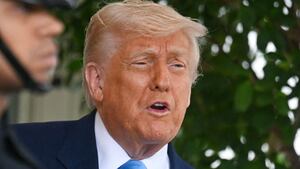
The president signed the GENIUS Act, which would establish a regulatory framework for stablecoin, but critics have raised concerns over conflicts of interest.
President Donald Trump signed a major bill into law on Friday that would further legitimize crypto and embed it in the U.S. financial system—and allow the president to enrich himself, critics say.
The GENIUS Act, which stands for Guiding and Establishing National Innovation for U.S. Stablecoins, will establish the first regulatory framework for stablecoins—digital currencies with value that is pegged to a fiat currency like the U.S. dollar—and paves the way for banks to launch their own stablecoins.
It passed with bipartisan support in the House of Representatives on Thursday by a vote of 308 to 122 after some haggling by GOP leadership with conservatives. The Senate passed the bill last month with bipartisan support, 68 to 30.
Proponents argued the legislation provides a much-needed, “commonsense” framework for stablecoin, but opponents warned it does not go far enough to protect consumers from scammers and slammed the legislation for not addressing conflicts of interest. The president himself stands to make a windfall off the industry while in office, critics contend.
In the lead-up to the bill’s passage, an amendment was introduced that would have banned the president, vice president, and top officials from issuing or profiting off stablecoin, but it failed to make it into the final legislation.
“There would have been a way to pass this legislation without the president himself being able to benefit from whatever legitimacy this could confer upon stablecoins and, of course, potentially boost his own stablecoin,” said Meghan Faulkner from the ethics watchdog group Citizens for Responsibility and Ethics in Washington (CREW).
As it stands, the legislation does not prohibit the president or first family from issuing a payment stablecoin.
“If the president can basically issue his own currency, then the White House just becomes a storefront for personal gain, and the mind can simply run wild with all the possibilities for corruption,” said Bilal Baydoun, director of Democratic Institutions at the Roosevelt Institute.
The White House has denied that the president has conflicts of interest when it comes to crypto, but as the president supported the legislation, Trump and his family have immersed themselves in the crypto world and raked in millions.
During the campaign, Trump launched his own crypto firm World Liberty Financial, which is being run by his sons and close business associates. His financial disclosures show he made $57 million from the sale of tokens last year alone even as the family’s digital venture was still in its infancy.
The president also launched the $TRUMP meme coin, a riskier digital asset, just before taking office again in January.

This spring, the Trump-backed firm launched its own stablecoin USD1, pegged to the value of the U.S. dollar. In May, it was used by the Abu Dhabi firm MGX for its $2 billion investment in Binance. Every time USD1 is used, the Trump family profits off transaction fees.
“We’re talking about potentially hundreds of millions of dollars in transaction fees, especially now that USD1 has been legitimized by the GENIUS Act,” Baydoun said. “You can expect a rush of money flowing into USD1, which is only going to enrich the Trumps further.”
Trump’s enthusiasm for crypto is a far cry from the president who once blasted bitcoin and other cryptocurrencies in 2019 as “not money” with value “based on thin air.”
The president courted the industry on the campaign trail, including appearing at the Bitcoin conference last July. On Friday, he acknowledged the industry support he got during the campaign while surrounded by industry leaders.
Since Trump took office, the crypto deregulation effort has picked up steam, and the Justice Department ended its crypto enforcement team and scaled back prosecuting crypto firms.
In May, the president even hosted top $TRUMP token holders at his private club, raising ethics concerns among watchdog groups.
The president has not only embraced the crypto world, vowing to make the U.S. a crypto leader and even signing an executive order to establish a bitcoin reserve and digital asset stockpile, he has surrounded himself with others who own millions in crypto.
According to an analysis by CREW, nineteen White House officials own between $875,000 and $2.35 million in crypto assets, which Trump proposed holding in a national reserve.
Sixteen Trump staffers held bitcoin, the most popular cryptocurrency asset, the analysis found. Three owned Bitcoin ETFs. The Bitcoin and ETFs made up between $818,019 to more than $2 million of the holdings. Other tokens such as Ethereum made up between $57,000 and $330,000 in White House staff assets.
Trump’s crypto-czar, David Sacks, and his firm, Craft Ventures, sold more than $200 million in crypto-related assets before he joined the Trump administration in January, according to his ethics memo.
.png)


No comments:
Post a Comment